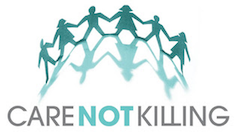Campaigners express concern after Italian Court legalises euthanasia

Care Not Killing has expressed concern and disappointment at a court ruling that has legalised euthanasia and assisted suicide in Italy for those with an irreversible condition and experiencing 'intolerable suffering'.
The Court said that those who facilitate the suicidal intention of a patient kept alive by treatments and suffering from an "irreversible pathology" should not be punished.
The Constitutional Court was considering the case of Marco Cappato, a right-to-die activist who was accused of assisting the suicide of Fabiano Antoniani, a 40-year-old tetraplegic in Switzerland. The ruling was criticised by politicians, doctors and the Catholic Church. Matteo Salvini, the former deputy prime minister and leader of the Northern League, said he would never agree to "suicide by law".
While Senator Simone Pillon, said patients should be given all possible palliative care, but should not be allowed to end their own lives, adding "Human life is sacred and inviolable".
Dr Gordon Macdonald, Chief Executive of Care Not Killing, commented: "This is deeply concerning and disappointing news. According to media reports this Court has, at a stroke of the pen legalised both assisted suicide and euthanasia, against the will and strong opposition of many in Italy.
"Alarmingly, this ruling seems to allow for those with chronic, non-life threatening conditions, which in the UK would apply to around 11 million people.
"The current law exists to protect the terminally ill, disabled people and the vulnerable from feeling pressure, real or perceived from ending their lives as we often see in those places that made this change.
"In the US states of Oregon and Washington, which have an assisted suicide system, a clear majority of those ending their lives, cite the fear of being a burden on their families or carers as a reason for their decision. At the same time due to health care rationing, we have seen those suffering from diseases including cancer refused potentially life-saving and life-extending treatments, while being offered the poison to kill themselves.
"In Canada, which only changed the law in 2016, the promised improvements to palliative medicine have not materialised and the safeguards in the legislation have already been challenged and removed, such as the requirement to be terminally ill. We have even had reports of patients being denied medical and social care, but offered the drugs to take their own lives."
Dr Macdonald continued: "In the Netherlands and Belgium, which allow euthanasia, laws have been extended from mentally competent terminally ill adults to non-mentally competent adults and even children.
"This is why Parliamentarians across the UK, have repeatedly rejected attempts to introduce assisted suicide and euthanasia, more than ten times since 2003, out of concern for public safety, including in 2015 when the House of Commons overwhelmingly voted against any change in the law by 330 votes to 118.
"It also explains why not a single doctors group or major disability rights organisation supports changing the law, including the British Medical Association, the Royal College of General Practitioners, the Royal College of Physicians, the British Geriatric Society and the Association for Palliative Medicine. Our current law does not need changing."
If you are affected by any details in this report, and would like to talk to someone, the Samaritans are available 24 hours a day see: www.samaritans.org


















